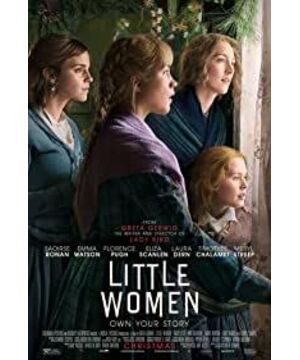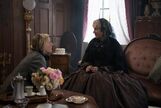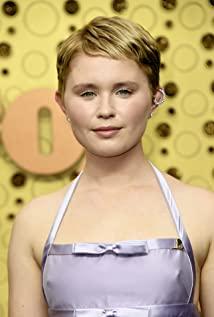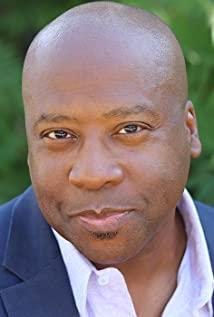Personal complaints, if there is any accidental injury, it is purely intentional.
That's all I can say after watching the movie. In general, I'm still quite disappointed, but such a cast ended up in such a ghostly appearance. I can't swallow this breath if I don't get 2 stars. On the other hand, probably because of my age, I don't appreciate the various "new and cutting-edge" adaptations. While watching this movie, I reminded myself to keep an open mind at times, because "Little Women" has had countless adaptations since the book came out a hundred years ago, and each version will inevitably be contaminated with the times. breath and the director's own philosophy. After all, isn't culture gradually reshaped and passed on in the hands of such transmitters from generation to generation? However, after doing so much mental building, I still don't like this version. I tried, I really tried.
First of all, the cast list can be quite intimidating, but it does not mean that they are suitable for their respective roles. Emma Watson is as bland as ever. When the four sisters went to deliver Christmas breakfast to the poor Hummel's house for the first time, Miss Watson picked up a baby with a silly smile, and let me play her as a UNICEF ambassador to Africa to condolence to hungry children. I don't know if Miss Watsons has read the original book, please Meg is originally a very womanly, motherly young woman. When you hold a child, can you at least have the motherly love temperament that an ordinary girl inadvertently exudes when she meets a cute baby ? And why are you always giggling?
Then there is Amy. In this 2019 film, the director greatly increased Amy's role and used a lot of content to create a three-dimensional and logical character. This must be admitted that the director did a good job. But this book is never about Amy herself, it's about sister-hood and sister-bond, after all, the title of the book is not "Amy Herself". In addition, Florence Pugh may be amazing in other films (although I haven't seen her films at all), but her strong body and old appearance are really not suitable for playing the youngest sister! It's even more inappropriate to finish the role of my sister from beginning to end! In the original book of "Little Women", Amy's age range is from 13 to 20 years old, director, have you read the original book?
If you can't bear Ms. Pugh's acting skills, you have to let her play Amy. You can find an older Laurie to suppress her aura? Sweet Tea's small physique is almost as good as calling Amy when she meets Amy. From a separate point of view, they each have their own youth, but together they look a little weird and have no chemical reaction. In addition, sweet tea and Ronan are so pleasing to the eye, and the chemistry between them is so sparkling, it is even more difficult to convince the audience: Jo doesn't love Laurie, Laurie really loves Amy, that's why she is with her marry.
As an aside, there are different opinions as to why Louisa May Alcott didn't let Jo and Laurie be together. Some readers said that if they were together, it would reduce the B-type of the novel and become a common romance ("Anne of Green Gables" expressed dissatisfaction); some readers said that it was reasonable not to be together, because their personalities were too similar, Married life is definitely not going to be happy (I don't think this part of the population has been in a relationship very much); it might make sense, but I think it's a bit Stockholm. I think the author didn't let Jo and Laurie be together largely out of revenge for the (female) readers who wrote to her back then to urge her why Jo and Laurie weren't together. So no matter how the later works justify themselves, Jo and Laurie not being together has always been a regret for many readers. The chemistry between them in this version of the movie will only serve as a hindrance to the belief that "she doesn't love him".
BTW female directors are really female directors, and it is annoying enough to carry LGBT private goods. In the breakup scene, Laurie says to Jo that you are going to fall in love with someone "someone", and instead of "him" in the latter sentence, "them" is used as gender-neutral singular pronoun. What does it mean that Jo will still fall in love with a girl? It's been a bit off.
Not to mention the sense of disobedience of a supporting role. Including Marmee, father and Aunt March of Meryl Streep. Don't get me wrong, my attitude towards Streep is the same as Cam below, her acting is impeccable; but in this show, probably because of the script, she is particularly slick, mainly because of her facial expressions Bitterness, sourness and meanness are not a good cover for the inner playfulness and joy. I speculated privately that the concept the director wanted to convey was, how could a rich widowed old woman be unhappy? This is quite in line with the idea of modern little girls, but it is contrary to the intention of the original author. If there were two words to describe Aunt March in Little Women, it would be: temperamental & judgmental. We do not deny that the aunt is really kind and lonely at the bottom of her heart, but her kindness will never be so obvious on the surface.
However, the above are small details that are not worth mentioning. I think the biggest problem with this version is that Beth's illness and death are not handled well enough. Some viewers may feel that this way of telling is very confusing. Indeed, as someone who only re-watched the original last year, I need to concentrate very hard to observe this film, otherwise I will be dropped into the film by the director accidentally. middle of the book, can't find the north. But I still think this kind of narrative is a good attempt, and it is worth encouraging and exploring. The director changed the way of telling the previous film and television works to follow the timeline of the original book, but instead displayed the four sisters side by side by looking for the intrinsically related scenes in the life clips of the four sisters over the years. This is the author's homage to "growing up" and her personal understanding of coming-of-age. But in my eyes, the most critical thing in the growth of the four sisters from "little girls" to "little women" is Beth's illness and Beth's death. And the film doesn't show it at all. (And Beth in this film is too ruddy)
Beth became ill because of a visit to the Hummel family. Marmee was caring for her seriously ill father in Washington at the time, and the other three sisters stayed home for selfish or lazy reasons. Meg and Jo have had scarlet fever long ago, and if they had gone with Beth, they might have been alerted that it was scarlet fever, allowing Beth to avoid getting sick and avoiding his eventual fate. It was also because of Beth's illness that Amy was sent to Aunt March's house. From then on, he replaced Jo and became Aunt March's new favorite, which eventually led to a series of plots such as Amy's trip to Europe, learning to paint, and Laurie's encounter in Europe. Beth's illness also prompted Marmee and his father to return home early, which involved a series of plots such as their praise and affirmation of Mr Brooke, Meg's object. This is also the heart of the story of the first book of Little Women (published in 1868). In the second book (published in 1869, also known as Good wives ), Beth's death brings the four sisters together again. Jo drives home from New York, and Amy and Laurie, who are also in Europe, learn of Beth's death. Consolation, emotional heating; eventually married as a couple and go home, etc. And Meg, like her actress Emma Watsons, is dispensable. I don't remember what Meg did. Maybe it was to leave her passive aggressive husband temporarily and go home to take care of her sister? Anyway, I think Beth's death is the moment when their childhood (childhood) really ends, as adult women (womanhood) begins. When looking at the "Little Women" wiki, I thought there was a particularly good saying, it said:
when (Alcott) using the term "little women" ... ... it represented the period in a young woman's life where childhood and elder childhood were "overlapping" with young womanhood. Each of the March sister heroines had a harrowing experience that alerted her and the reader that "childhood innocence" was of the past, and that "the inescapable woman problem" was all that remained.
And the most important harrowing experience, the saddest and most growing moment of growing up, should be related to Beth in both films. So the director's weight loss in the film is what I can't let go of the most. After all, Beth can even influence Joey. just kidding.
For example, the director has emphasized too many times on the message "A woman's life can have many choices", and it is enough to interpret it in a complicated, multi-angle and all-round way in every small paragraph from the beginning to the end. I really want to tell the director that you can dial it down a notch, nobody is on the other side, for example, the 1994 movie version is a good way to neutralize women's recognition and acceptance of their place in the world and their own initiative to find themselves The process of place in the world. The overemphasis makes the film look like a marketing campaign, which misses the true "classic". After all, this book is actually a "Christmas special" like Dickens' "A Christmas Carol", focusing on the warm, pure and sparkling things in life.
Although I am disappointed with the movie, it cannot be denied that it is a very pleasing movie. The director has faithfully restored Fu Hua Dao, especially the shooting scenes. Either way, it's a 21st century woman's tribute to a woman author trapped in the 19th century, a love letter or thank you letter from the director to Louisa May Alcott. Thanks to her for inspiring so many girls, whether it is to make them love life more or love literature more, they finally love themselves more, think more and find their place in this world. This is the meaning and value of good literature. Here I also strongly recommend the original book. This is the only book I love and hate. Despite the didactic tone of disgusting this book, I still love the author's vivid and powerful writing. It's not too magical.
Finally, attach the tourism map of the "Little Women" movie. Interested and qualified hard-core fans can follow this map to the real shooting location to experience the charm of the year.
The last last stills.
View more about Little Women reviews











